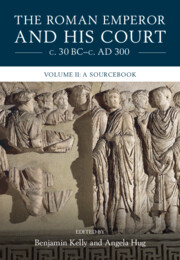Book contents
- Frontmatter
- Dedication
- Contents
- Figures
- Contributors
- Acknowledgements
- Conventions
- Abbreviations
- List of Roman Emperors to c. AD 300
- Register of Prominent Courtiers
- Major Authors and Literary Works Translated in this Volume
- Glossary
- Introduction: The Sources for the Roman Court
- 1 Conceptualizing the Roman Court
- 2 Court Spaces
- 3 Court Relationships
- 4 Rituals and Ceremonial
- 5 Picturing the Court
- 6 Narratives of Court Crises
- Bibliography
- Index of Sources
- Index of Personal Names
- General Index
1 - Conceptualizing the Roman Court
Published online by Cambridge University Press: 29 September 2022
- Frontmatter
- Dedication
- Contents
- Figures
- Contributors
- Acknowledgements
- Conventions
- Abbreviations
- List of Roman Emperors to c. AD 300
- Register of Prominent Courtiers
- Major Authors and Literary Works Translated in this Volume
- Glossary
- Introduction: The Sources for the Roman Court
- 1 Conceptualizing the Roman Court
- 2 Court Spaces
- 3 Court Relationships
- 4 Rituals and Ceremonial
- 5 Picturing the Court
- 6 Narratives of Court Crises
- Bibliography
- Index of Sources
- Index of Personal Names
- General Index
Summary
There were several Latin and Greek terms that roughly correlated with our concept of ‘court’, including aula, palatium, and (from the late third century) comitatus. Roman authors were also capable of making generalizations about their court as an entity, many of them moralizing and negative, but some of them panegyrical. This conceptual framework regarding the court was partly inherited from the Hellenistic world. This chapter presents a selection of literary and epigraphic sources that illustrate the Romans’ conception of their own court as a distinct entity.
- Type
- Chapter
- Information
- The Roman Emperor and his Court c. 30 BC–c. AD 300 , pp. 10 - 31Publisher: Cambridge University PressPrint publication year: 2022



